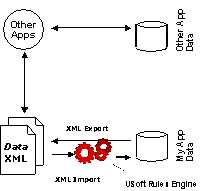|
The
repository stores well-structured information about application
data. You can use the XML component to export table data along with
XML elements that describe this table data. This way, you create
conceptually rich export data.
You can also import an XML
document and process instructions that are included in this
document. In this case, the Rules Engine acts as an XML agent. The
way in which XML data is processed is equivalent to SQL based data
manipulation.
The Rules Engine uses the
concept of data domains. In XML, the corresponding concept is
expressed in Document Type Definitions (DTD's) or, more recently,
in XML Schemas. The USoft XML component makes it possible to create
DTD documents that contain these domain definitions.
All XML conversion facilities
can be used by batch-oriented processes, by interactive processes,
or via the Remote Rules Service API.

Figure 18-1: Data Exchange Between Application
Tables and XML
This figure shows the
principle of data exchange between USoft application tables and
XML. This way you can communicate with other applications that
support XML. When importing XML data, the Rules Engine checks all
rules.
|

